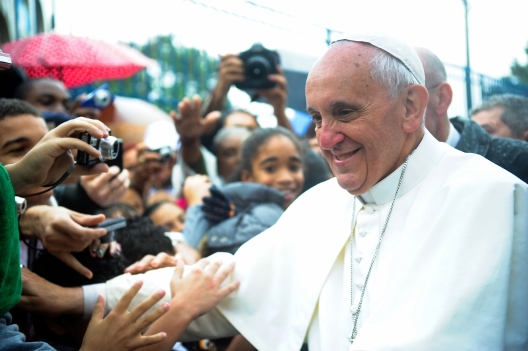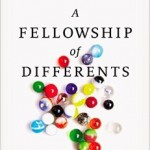
Guest Blogger: Timothy Colegrove Tim and Alice Colegrove live and work in Boston, MA where they serve with the Conservative Mennonite Conference (CMC) as evangelists and prospective church-planters. Their vision is to establish a multi-ethnic evangelical Anabaptist church in the city of Boston committed to discipling new believers, breaking down socio-economic barriers, and gathering an eclectic community around Jesus’ table. Prior to working with the CMC, Tim and Alice served for many years as advocates, street pastors, and family to homeless youth in Harvard Square.
You can contact Tim at timothy[dot]colegrove [ a t ] g m a i l [dot] c o m
“A Church which “goes forth” is a Church whose doors are open. Going out to others in order to reach the fringes of humanity does not mean rushing out aimlessly into the world. Often it is better simply to slow down, to put aside our eagerness in order to see and listen to others, to stop rushing from one thing to another and to remain with someone who has faltered along the way.”
-Pope Francis I
It seems that one can hardly switch on a smartphone without catching wind of something beautiful that Pope Francis has done. From inviting the homeless into his residence to washing the feet of prisoners in Rome, Francis offers a refreshingly Christ-like example. Needless to say, in an age of bad news it has been deeply encouraging for me to hear something positive said of a well-known Christian figure.
As I took time this week to read Francis’s apostolic exhortation, the Evangelii Gaudium (which can be accessed here at the Vatican’s website), I was struck by how aggressively he has challenged the dehumanizing spirit of isolation and enmity that is so pervasive in the world today. Not only does Francis challenge the exclusion inherent in today’s global economic conditions, but also the spirit of isolation and exclusion brought about by greed and individualism. In his reflection on the joy of the Gospel in the preface to the Evangelii, he cites Pope Paul VI who wrote, “technological society has succeeded in multiplying occasions of pleasure, yet has found it very difficult to engender joy.” Francis seeks to counter this trend within the Church by emphasizing the role of joyful invitation in the communication of the Gospel. He writes,
“Instead of seeming to impose new obligations, they [Christians] should appear as people who wish to share their joy, who point to a horizon of beauty and who invite others to a delicious banquet. It is not by proselytizing that the Church grows, but “by attraction.”
Throughout the Evangelii, Francis communicates a vision of a renewed universal Church whose evangelism is marked by joy, connectedness, authenticity, and intimacy. Francis’s vision for the Church is decidedly local; beckoning Catholic hierarchy to consider a decentralization of ecclesial power while emphasizing the importance of the local parish and the role of pastoral workers and missionaries in contextualizing the Gospel in their own communities. Francis quite clearly shares the Slow Church desire to, “unmask and repent of our industrialized approaches to church.” In his exhortation Francis lays out a clear vision for how the church can reimagine its life together and rediscover the communal feast waiting at Christ’s table.
With all his talk of localization, relational prioritization, and intimacy might I suggest that we have a “slow Pope?”
As Alice and I move forward in our mission to plant a church with the Conservative Mennonite Conference in Boston, I find myself in strange unity with the Pope. Who would have imagined that a Mennonite would find such agreement with the head of the Catholic Church, an institution that viciously oppressed early Anabaptist disciples? Yet while reading the Evangelii, I could feel my heart breaking out in applause and spirit-filled agreement at his call to greater connection with other disciples and with the communities around us. Undoubtedly this is the Church that a relationally starved culture needs so badly.
I sense the relational poverty that Pope Francis has challenged in my own community of Boston, even as I live in what is arguably one of the most community-centered neighborhoods of the city. I can feel myself fighting it every time I pull out my smartphone during a meal, every time I try to make plans with a friend but find my schedule too crowded. I can sense its presence in every biting partisan argument I overhear and every careless opinion offered in a public forum. Yet I’m aware also of those times when I am engaged in the fight to end this poverty. I sense the battle is being won every time I write a poem or sing songs with my friends, share a pint at a local pub, pray with others in my community, or choose to pick up the phone instead of leaving a message on somebody’s Facebook page. When I take the time to listen carefully and truly empathize with a person God loves. It is in these intimate encounters with others that Francis enjoins us to seek fertile soil for the Gospel to take root. As he writes in the Evangelii:
“… the Gospel tells us constantly to run the risk of a face-to-face encounter with others, with their physical presence which challenges us, with their pain and their pleas, with their joy which infects us in our close and continuous interaction. True faith in the incarnate Son of God is inseparable from self-giving, from membership in the community, from service, from reconciliation with others.”
As church-planters, this is the kind of intimacy and emotional vulnerability that Alice and I hope to see in the church community we are forming. Yet what my ministry experience has taught me is that it cannot be achieved without a significant investment of time. If we desire to see the Gospel move out in power and love in our communities there is one simple thing we will absolutely need to do: clear our schedules and make time for people. In his exhortation, Francis urges us to remember that the Church must be first and foremost a community, not a program or an institution. Human beings are the materials of which Christ’s body is assembled, and human beings must not be treated like projects. This essential challenge for the church to return to its glorious humanity is at the heart of Francis’s Evangelii. Francis is calling the universal Church to communicate the Gospel in the midst of our relationships, to see evangelism as a natural joy rather than a burdensome mandate. In this context, Francis urges us to practice patience and to recognize that this means being committed to the “long game” that will inevitably involve suffering and sacrifice. As he writes in his exhortation:
“An evangelizing community gets involved by word and deed in people’s daily lives; it bridges distances, it is willing to abase itself if necessary, and it embraces human life, touching the suffering flesh of Christ in others. Evangelizers thus take on the “smell of the sheep” and the sheep are willing to hear their voice. An evangelizing community is also supportive, standing by people at every step of the way, no matter how difficult or lengthy this may prove to be. It is familiar with patient expectation and apostolic endurance. Evangelization consists mostly of patience and disregard for constraints of time.”
Though many of his commentators have expressed excitement about the Evangelii’s emphasis on social justice and global poverty, what I am most excited about is his renewed focus on people and community. As we move forward with the work of church-planting here in Boston, I hope to see us embody Francis’s refreshingly human ecclesial posture. In an age of instant machines and careless commerce, I look forward with hope to seeing a local expression of the universal Church Francis envisions; marked by a deep authenticity, a patient love for mankind, and full of the joy that the Gospel of Jesus Christ brings.












